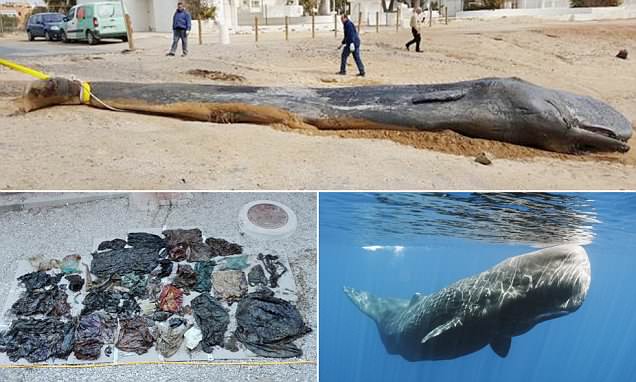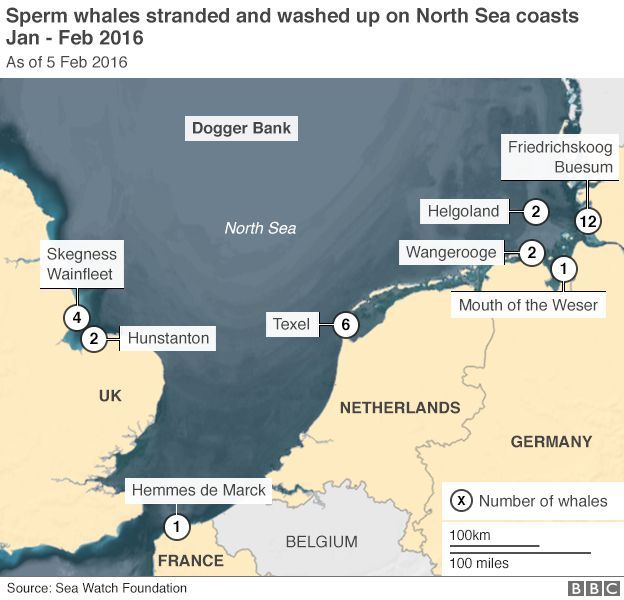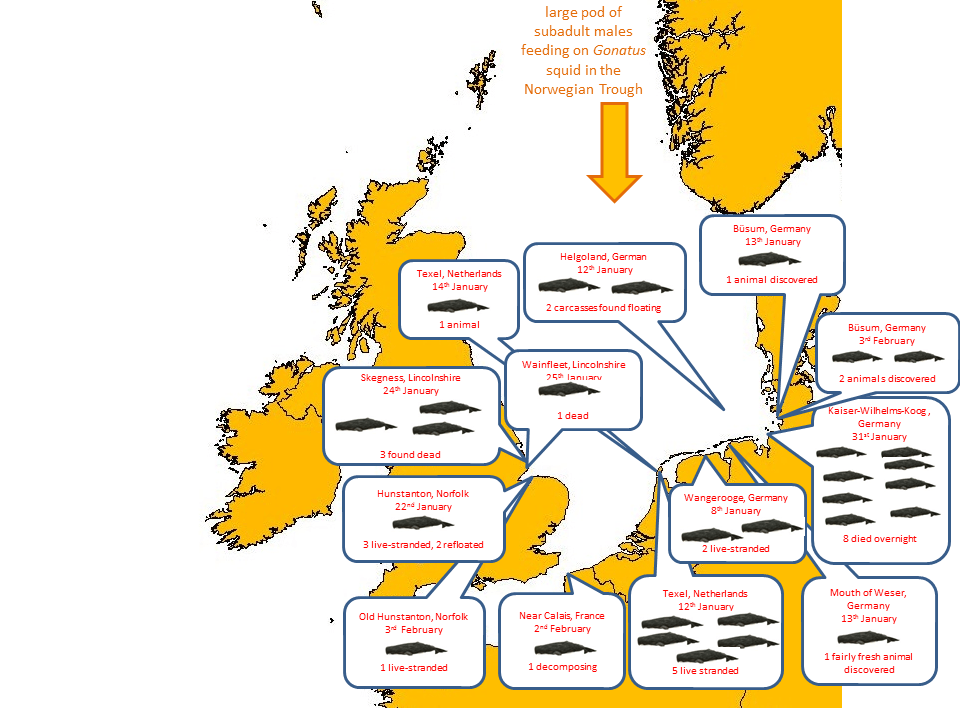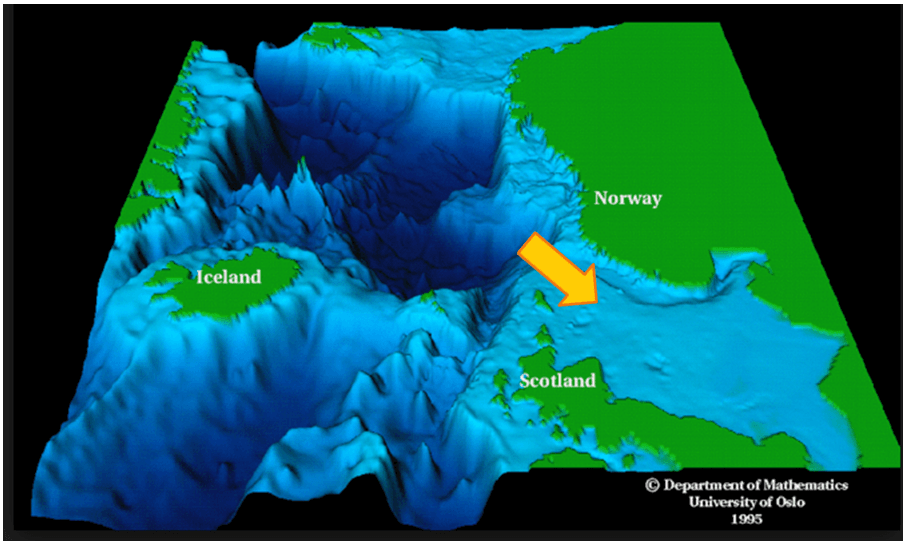Plastics confirmed to be the cause of mortality in the largest ever stranding event of sperm whales recorded in Europe.
In January 2016, 29 sperm whales were recorded stranded along the North Sea coasts from Germany through the Netherlands, to France and the U.K. Many of the whales stranded alive and later died, leaving cetacean biologists curious as to the cause of this unusual mortality event (UME).
Post mortems of some of the whales stranded have revealed they had plastic in their stomachs, including parts from cars. This is not the first time plastic bags have been blamed for the deaths of sperm whales. The Athens-based Pelagos Cetacean Research Institute found that more than a third of the sperm whales found dead in Greek waters had stomachs blocked by plastic waste.
This is now the largest stranding event of sperm whales ever recorded in the North Sea. Mass strandings of this nature are rare although they have occurred over at least the last five hundred years. The last mass stranding in Britain was of six sperm whales at Cruden Bay (Grampian Region) in January 1996, and before that of eleven on Sanday (Orkney) in December 1994. There have been 14 mass strandings of four or more sperm whales in the North Sea since the 16th century.
However, mass strandings of sperm whales in the southern North Sea region are not a new phenomenon. These strandings also tend to occur in the same coastal localities, and particularly around the southern North Sea. All of the mass strandings recorded have also been between November and March.
It seems that the number of strandings of sperm whales has increased in recent years. The average was less than one per year until the mid-1980s; since then, the average has remained 5-7 per year.
The most conclusive explanation of the stranding is that a group of sub-adult male sperm whales were feeding upon squid in the Norwegian Sea directly north of the North Sea. This is a favoured region for them and for one of their principal prey, squid of the genus Gonatus. The first strandings examined early last month on the Dutch coast contained several remains of Gonatus, as have some of the German stranded animals. More recent strandings have had empty stomachs and the whales have tended to be dehydrated (they obtain water from their prey) suggesting that they had run out of food by this time. After feeding, the whales may have moved southward along the coast of Norway within the Norwegian Trough, a tongue of water of more than 200 m depth stretching down the northeastern North Sea (see eastern sector of Area 1 in the map below, either following more squid shoals or perhaps seeking less turbulent seas in the face of the recent westerly storms. As they ranged further and further south, they entered areas with water depths significantly less than the 500-3,000 metres of the Norwegian Sea and offshore North Atlantic, their usual habitat.
Areas of the North Sea the whales travelled through such as the Dogger Bank, are shallow with gentle sloping continental shelf slopes, which may cause difficulty in the whale's navigation.
Sperm whales in northern Europe are invariably males, and usually sub-adults. Female sperm whales largely remain year round in the tropics and subtropics, attended by mature males who for the most part control access to the females. Soon after young males have grown to sexual maturity, they start to leave the breeding groups and migrate into high latitudes. A male sperm whale typically reaches sexual maturity around 18-19 years of age, and measuring a length of c. 12 metres. The animals that strand around the British Isles are usually c. 12-15 metres in length, in other words young adults. The indication therefore is that once whaling ceased (which had often selected for large bulls), there was greater competition for females within breeding groups so that more groups of sub-adults tended to migrate towards high latitudes, hence the increase in numbers of strandings and of groups of young males.
The fact that so many whales stranded in the Mediterranean had swallowed hundreds of plastics bags shines an ugly truth on the disconnect of humans are our natural history. During the 18th, 19th and 20th centuries, during the industrial revolution, sperm whales were hunted to near extinction, mostly for their oil, which was used for light and lubrication. Up until the late 1980's sperm whales were still being killed in their hundreds off the Azores in the mid Atlantic. Even after the moratorium/ban on whaling in 1986, it seems whales have not escaped the plight of human intrusion and impact on their environment and indeed survival.
If you would like tips on how to reduce your plastic use, Read more here; https://www.orcireland.ie/effortless-little-steps-to-preserve-the-marine-environment.
**Breaking News- Sperm whale found stranded in Indonesia with 1,000 pieces of plastic in it's stomach. Read more here: https://www.orcireland.ie/sperm-whale-stranded-in-indonesia-found-to-have-1-000-pieces-of-plastic-in...
We are a non-governmental organisation that run regular "Marine Cleans". Check out our "Get Involved" tab if you would like to join in and help us become #OceanHeros, picking up one piece of plastic at a time from Irish shores. Some of the most frequent debris washed ashore include plastic bottles, plastic bags, cotton bud sticks, bottle caps, crisp packets, sweet wrappers, old shoes, fishing line, ghost nets, broken lobster pots, car parts and much more.
© Ocean Research & Conservation Ireland (ORCireland) and www.orcireland.ie , est. 2017. Unauthorized use and/or duplication of this material without express and written permission from this site’s author and/or owner is strictly prohibited. Excerpts and links may be used, provided that full and clear credit is given to Ocean Research & Conservation Ireland and www.orcireland.ie with appropriate and specific direction to the original content.
SHARE THIS ARTICLE

















